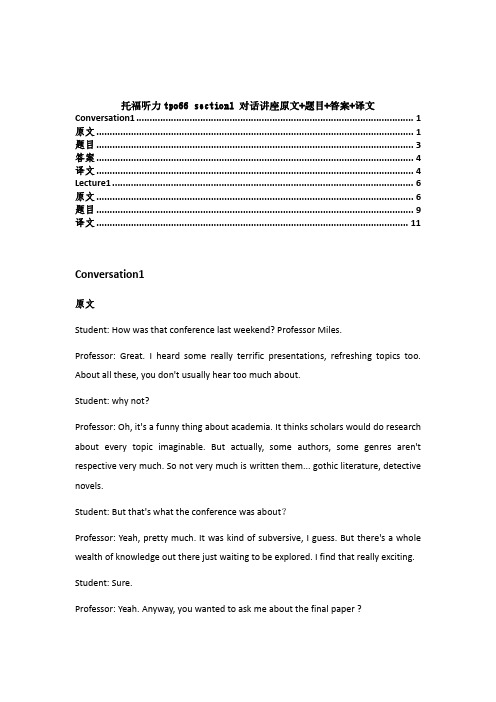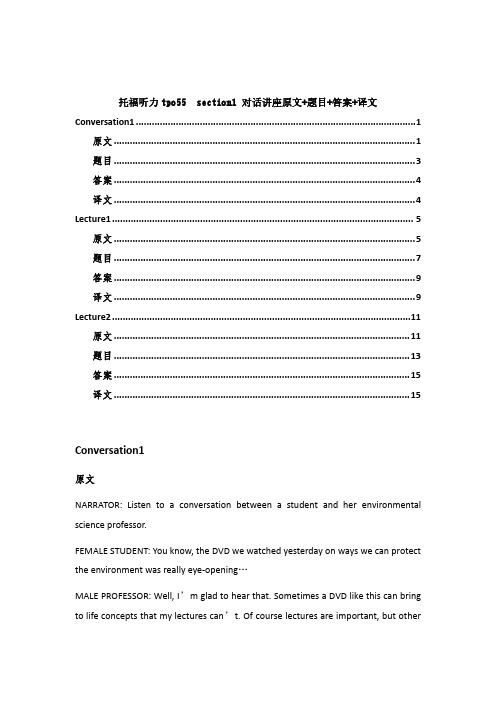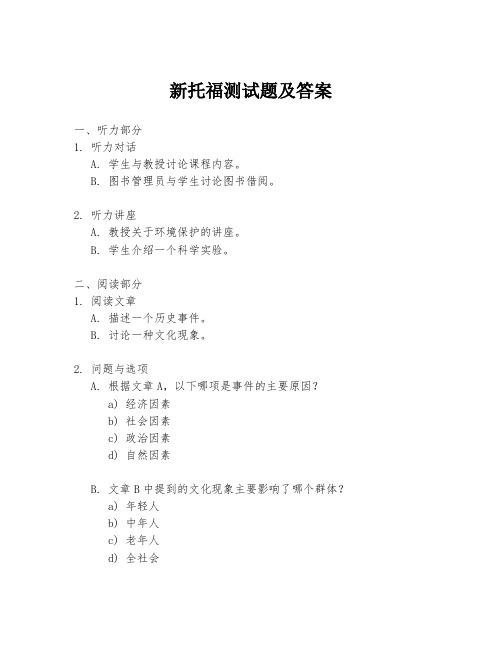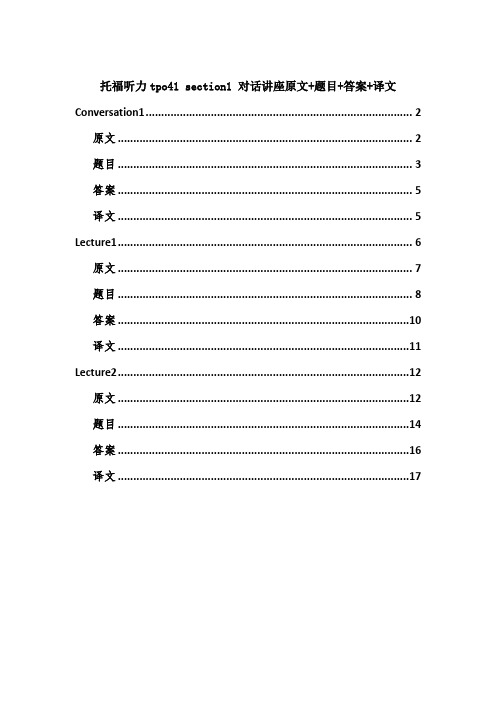托福听力讲座题目:环境科学课
托福听力tpo51 section1 对话讲座原文+题目+答案+译文

托福听力tpo51section1对话讲座原文+题目+答案+译文Conversation1 (1)原文 (1)题目 (3)答案 (5)译文 (5)Lecture1 (7)原文 (7)题目 (9)答案 (11)译文 (11)Lecture2 (13)原文 (13)题目 (15)答案 (17)译文 (17)Conversation1原文NARRATOR:Listen to part of a conversation between a student and her biology professor.MALE PROFESSOR:So the assignment is to reproduce one of the animal camouflage experiments we read about in our text book.Which experiment did you pick?FEMALE STUDENT:Well...I was wondering if I could try to reproduce an experiment that's kinda the opposite of what was discussed in the textbook?MALE PROFESSOR:So,instead of how and why an animal might hide itself,you want to do something about why an animal might want to be seen?Hmmm.Tell me more.FEMALE STUDENT:Well,I got the idea from one of the journals you said we should look at…it's an experiment about,um,they called them eyespots in the article?MALE PROFESSOR:Eyespots,sure,the patterns on the wings of moths and butterflies that are generally believed to scare off predators because they look like big eyes.FEMALE STUDENT:Yeah,except the article was about an experiment that disputes that theory.MALE PROFESSOR:Well,we know that the markings do scare the birds,but the idea that the spots look like eyes is,well that's just a commonly held belief.FEMALE STUDENT:So—that's not even based on research?MALE PROFESSOR:Well,this whole idea of moth or butterfly markings being scary because they look like eyes rests on how we imagine that their predators—like birds —perceive the markings.And we can never really know that.All we can do is observe bird behavior.But tell me more about the experiment.FEMALE STUDENT:OK,so the experiment looked at the shapes of the markings on moth wings.The researchers wanted to know if the markings that were round or eye-shaped were more effective at deterring predators than square or rectangular markings.MALE PROFESSOR:OK…FEMALE STUDENT:Yeah.So,they attached food to paper models of moths,with different shaped marks drawn on the wings,to see how birds reacted.And what's interesting is,they realized that the round marks were not more effective at scaring birds than other shapes.MALE PROFESSOR:Were they less effective?FEMALE STUDENT:No,they were about the same...but what researchers diddetermine is that larger markings are more effective than smaller markings at scaring off prey.They called this phenomenon“visual loudness.”MALE PROFESSOR:Visual loudness,huh.Well,I guess it's not all that shocking,if you think about it.FEMALE STUDENT:So,anyway,is it OK?Can I repeat this experiment and write about it?MALE PROFESSOR:Yes,I think that'll work.The problem I foresee is,well,where? This is an urban campus...You'll have a hard time finding a good place to set up the experiment.FEMALE STUDENT:Oh,I-I wasn't planning on doing it on campus.I'm going home for spring break,and my family lives in the country,far from the nearest city.I can set it up in the backyard.MALE PROFESSOR:Good idea.Except one week is not a lot of time.So you'll need to make some adjustments to have enough data.I'd set up the experiment near a bird feeder,and get in as much observation time as you can.题目1.Why does the student talk with the professor?A.She wants permission to revise an experiment that she conducted earlier.B.She has a question about the findings of an experiment in the textbook.C.She wants to reproduce an experiment that is not in the textbook.D.She would like some advice about how to study butterfly and moth behavior.2.What does the professor say is a common assumption about certain markings onbutterfly and moth wings?A.That the markings are usually hidden from viewB.That the markings attract some kinds of birds more than othersC.That some birds perceive the markings as large eyesD.That butterflies and moths use the markings to attract mates3.What were the results of the experiment that the student describes?[Click on2 answers.]A.Birds reacted to round markings the same way they reacted to square markings.rge markings scared birds more than small markings did.C.Most birds ignored markings that looked like eyes.D.Birds were attracted to more colorful markings.4.Why does the professor mention a bird feeder?A.To suggest a strategy that may help the student carry out her task successfullyB.To recommend a place on campus that is suitable for the student's projectC.To discuss another experiment that has yielded surprising resultsD.To point out a problem in the design of the original experiment5.What can be inferred about the student when she says this:Professor:Well,we know that the markings do scare the birds but the idea that the spots looked like eyes is……well,that is just a commonly held belief.Student:So,that’s not even based on research?A.She is skeptical about what the professor just told her.B.She just realized that she designed her experiment incorrectly.C.She is worried that she misunderstood something that she read.D.She had assumed that there was scientific evidence for the theory.答案C C AB A D译文旁白:请听一段学生和其生物学教授之间的对话。
托福听力tpo66section1 对话讲座原文+题目+答案+译文

托福听力tpo66section1对话讲座原文+题目+答案+译文Conversation1 (1)原文 (1)题目 (3)答案 (4)译文 (4)Lecture1 (6)原文 (6)题目 (9)译文 (11)Conversation1原文Student:How was that conference last weekend?Professor Miles.Professor:Great.I heard some really terrific presentations,refreshing topics too. About all these,you don't usually hear too much about.Student:why not?Professor:Oh,it's a funny thing about academia.It thinks scholars would do research about every topic imaginable.But actually,some authors,some genres aren't respective very much.So not very much is written them...gothic literature,detective novels.Student:But that's what the conference was about?Professor:Yeah,pretty much.It was kind of subversive,I guess.But there's a whole wealth of knowledge out there just waiting to be explored.I find that really exciting.Student:Sure.Professor:Yeah.Anyway,you wanted to ask me about the final paper?Student:Yeah,which I see now ties into the theme of that conference,since we're supposed to write about a book from one of those lesser genres.I was wondering what about science fiction?Professor:Sure.Though it's a genre that's actually getting more and more respect within academia.There was even a talk at the conference about Jack Vance.Student:He wrote planet of adventure,right?Professor:Yeah.He's a well-researched respected science fiction writer.If you're interested in science fiction,you could look them up.That leads you to lots of other authors and lots of possibilities for your paper.Student:Great.I'm relieved you think that,that's a good genre to study.I'll find a book that interests me and do the paper on that.It seems like most people assume that science fiction is kind of like,I don't know,junk literature.Professor:Yes,a lot of people do.Student:Yeah,but I've read somethings and I think that some of it is really well written and it takes so much imagination to write SCI-Fi.Professor:Well,careful,though,there is a difference between science fiction and Scifi.Student:What do you mean?Professor:SCI fi,that's what you tend to see in films.It has all the spaceships and robots,and it focuses on exotic technology you know factor like special effects,at the expense of a well written story.I think a lot of people don't realize this and tend not to make a distinction.Student:Okay.Professor:But true science fiction is much more intellectual than that. The story is very important,and even though it might take place in an imaginary world,it might have exotic gadgets.The focus is on the plot.Science fiction creates metaphors about our world.And well what it means to be human.It's meant to getpeople to think about real things like history and human behavior.That's worthy of your time,but not SCI fi.Student:Great.Well.Can I let you know next week which book I want write about?Professor:Sure.题目1.Why does the man go to see the professor?A.To find out what the assignment is for the final paperB.To discuss a conference that the professor attendedC.To get a topic area approved for a class assignmentD.To find out the difference between science fiction and sci-fi2.What was unusual about the conference that the professor attended?A.It included presentations by many scholars who were not well known to the professor.B.It included presentations by students.C.It focused on authors who are respected by most scholars.D.It focused mostly on less popular literary genres.3.Why does the professor mention Jack Vance?[Click on2answers.]A.To encourage the man to write a paper about Planet of AdventureB.To support her point that some authors should be researched moreC.To indicate a way for the man to begin looking for a suitable topicD.To demonstrate that science fiction is gaining attention from scholars4.What is the man’s attitude toward science fiction?A.He is confident that it will become more respected.B.He disagrees with a commonly held opinion about it.C.He understands why it is not well respected.D.He is impressed that it includes exotic technology.5.According to the professor,what is a key difference between sci-fi and science fiction?A.Sci-fi is intellectually more challenging than most science fiction.B.Science fiction stories are often made into films.C.Science fiction places more importance on plot than sci-fi does.D.Science fiction makes little use of exotic technology.答案C D CD B C译文1.学生:上周末的会议如何,Miles教授?2.教授:很好,我听到了很多非常精彩的演讲,以及令人耳目一新的话题,而且这些话题平时都没机会听到。
托福听力tpo55 section1 对话讲座原文+题目+答案+译文

托福听力tpo55section1对话讲座原文+题目+答案+译文Conversation1 (1)原文 (1)题目 (3)答案 (4)译文 (4)Lecture1 (5)原文 (5)题目 (7)答案 (9)译文 (9)Lecture2 (11)原文 (11)题目 (13)答案 (15)译文 (15)Conversation1原文NARRATOR:Listen to a conversation between a student and her environmental science professor.FEMALE STUDENT:You know,the DVD we watched yesterday on ways we can protect the environment was really eye-opening…MALE PROFESSOR:Well,I’m glad to hear that.Sometimes a DVD like this can bring to life concepts that my lectures can’t.Of course lectures are important,but otherforms of presentation—like DVDs—help get across the concepts I want you to understand,too.FEMALE STUDENT:I agree.And the DVD got me thinking about the project you assigned.Now,I know we’re not supposed to work with anyone else for this assignment,but two of us think we have a really good idea.MALE PROFESSOR:OK,I’m listening.FEMALE STUDENT:Well,the student from class who I wanna work with—it’s Jessica Smith—you see,she has a part-time job at the hotel on campus…uh…where parents and people who are here for conferences stay?MALE PROFESSOR:Ah,yes.The environmental science department just hosted a conference not too long ago,and we had several attendees who stayed there.They really enjoyed staying at that hotel.FEMALE STUDENT:I’m sure.Jessica says it’s really nice,but it’s not so environmentally friendly.MALE PROFESSOR:Hmm…I see.Well,hotels may be reluctant to make changes to protect the environment if it could be perceived as negatively affecting the comfort of hotel guests.FEMALE STUDENT:Well,that has to do with our idea for the project.Uh…Jessica and I wanna do an assessment of the hotel and see what they can do to save energy, and create less pollution—without interfering with the positive experience of patrons.And I figured since she works there,it’d be easier for us to do the project together.Plus she already ran the idea by the hotel manager,and he’s on board with it.He was even telling her how he can use our work to apply for a grant from a local environmental foundation for money to make energy-saving upgrades and stuff!So we’d make recommendations,then he’d use our findings to make real changes.MALE PROFESSOR:That’s certainly a compelling idea—and it definitely fits within the general guidelines of the project.OK.Just give me an outline of what you plan todo,and,well,I’m a little worried.…I’ll still need you to submit the paper in the format we discussed in class,not whatever format the hotel manager might want.题目1.What is the conversation mainly about?A.A grant the student wants to apply forB.The student’s proposed plan for a class assignmentC.A project presented in a DVD the class watchedD.The student’s part-time job at a hotel2.What does the student ask the professor to allow her to do?A.Take extra time on her projectB.Write a grant rather than a paperC.Work with a partner on an assignmente her job as the focus of her project3.Why does the professor mention a science conference?A.To suggest that the student attend itB.To indicate that he is familiar with the hotelC.To state where he got information about a new discoveryD.To state where he got the video that he showed in class4.According to the conversation,why might the campus hotel managers be slow to adopt environmentally friendly policies?A.They are concerned that their customers may not be happy with the changes.B.They are not knowledgeable about the potential benefits.C.No financial help is available for reducing the initial cost of making the changes.D.They have tried to adopt such policies and found them of little use.5.What concern does the professor express?A.That the hotel manager might not allow the research to take place at the hotelB.That Jessica Smith might be too busy with her job to do the projectC.That the student’s idea for the project is overly ambitiousD.That the student might not focus on fulfilling all the requirements of the project答案B C B A D译文旁白:听一个学生和她的环境科学教授之间的对话。
最牛托福听力技巧大全

托福听力技巧一. 听力内容·分类1.Conversation(1)Office办公室A.作业内容·B.论文内容·C.课堂内容·D.实·地考察E.实·验室(2)Student service学·生服务A.课程事务B.登记注册C.图书馆D.公告栏E.食堂F.转学·G.打工H.游玩2.Lecture(1)Arts艺术类A.A rchitecture建筑B.C ity Planning城市规划C.l iterature 文学·D.Photography摄影E.Other art forms其他艺术形试a)F olk and tribal art民间和部落艺术b)C ave and rock art岩洞和石壁艺术(2)Life science生命科学·A.Biology生物学·a)Animal behavior动物行为,如:迁徙、觅食、防御行为b)Botany植物学·c)Oceanic biology海洋生物B.Environmental science环境科学·a)Climate change气候变化b)Habitats of animals and plants动植物的栖息地(3)Physical science自然科学·A.A stronomy天文学·B.G eography and geology地理地质a)G laciers, ice ages冰川、冰河纪b)S eismology: earthquakes, continental drift, volcanoes地震学·:地震、大陆漂移、火山c)Deserts and other extreme environments沙漠和其他极端环境C.C hemistry化学·(4)Social science社会科学·A.P hilosophy哲学·a)A ristotle亚里士多德b)P lato柏拉图B.p sychology 心理学·C.h istory 历史a)A rcheology 考古学·b)A rt history艺术史c)Film history电影史d)T heater History戏剧史ernment 政府E.sociology 社会学·F.economics 经济学·G.Anthropology人类学·二. 五大题型1.主旨题(1)提问方试a)What problem does the man have?b)What are the speakers mainly discussing?c)What is the main topic of the lecture?d)What is the lecture mainly about?e)What aspect of X does the professor mainly discuss?f)Why does the student visit the professor?g)Why does the student visit the registrar’s office?h)Why did the professor ask to see the student?i)W hy does the professor explain X?(2)笔记技巧无笔记,通过整体感知提炼主旨,相信第一印象(3)答题原则a)注意干扰选项特征:不精确、不相关、太宽泛、太具体b)注意对话中的一致性问题,区分内容·与目的c)注意对话双方目的不同2.细节题(1)提问方试a)According to the professor, what is one way that X can affect Y?b)According to the professor, what is the main problem with the X theory?c)What is X?d)What resulted from the invention of X?(2)笔记技巧a)六大要点:程序procedures、定义definitions、举例examples、原因和影响causes and effects(罗列不需记)、问题和回答questions and answers、赞成和反对pros and consb)多次出现的词要记c)注意否定词(3)答题原则a)注意干扰选项特征:相似表达但不完全一致、相同词汇但表达意思不同、与原文相矛盾、原文未提及b)无法确定的则选择与主题最符合的选项3.重听题(1)提问方试a)What does the professor imply when he says this?b)What is the purpose of the woman’s response?c)What can be inferred from the professor’s response to the student?d)Why does the student say this?e)What can be inferred about the student when she says this?f)What does the woman mean when she says this?(2)笔记技巧重听时无需做笔记(3)答题原则a)重听开始前先迅速扫读选项,并作出预测b)第二遍最关键c)理解说话人的真实·意图而不仅仅只是字面意思(4)习语俗语a)Tell me about it! 那还用说!(表示强烈赞同)b)You name it! 不再讨论其他的了That sort of thing, you see?To name just a few.The list goes on.c)Put it together 表示总结All in allIn a nutshelld)I don’t know about that. 表示委婉拒绝e)I think you get the picture. 你懂的。
新托福测试题及答案

新托福测试题及答案一、听力部分1. 听力对话A. 学生与教授讨论课程内容。
B. 图书管理员与学生讨论图书借阅。
2. 听力讲座A. 教授关于环境保护的讲座。
B. 学生介绍一个科学实验。
二、阅读部分1. 阅读文章A. 描述一个历史事件。
B. 讨论一种文化现象。
2. 问题与选项A. 根据文章A,以下哪项是事件的主要原因?a) 经济因素b) 社会因素c) 政治因素d) 自然因素B. 文章B中提到的文化现象主要影响了哪个群体?a) 年轻人b) 中年人c) 老年人d) 全社会三、口语部分1. 独立口语任务A. 描述一个你曾经克服的困难。
2. 综合口语任务A. 根据听力对话和阅读文章,讨论学生如何解决遇到的问题。
四、写作部分1. 综合写作任务A. 阅读一篇文章,然后听一个相关的讲座,最后写一篇文章总结两者的主要观点和论据。
2. 独立写作任务A. 你同意以下观点吗?“教育是个人成功的关键因素”。
请给出你的理由和例子。
五、答案1. 听力部分A. 正确答案:教授建议学生阅读额外的资料来加深理解。
B. 正确答案:学生需要在一周内归还图书。
2. 阅读部分A. 正确答案:b) 社会因素B. 正确答案:a) 年轻人3. 口语部分独立口语任务答案示例:我克服的困难是学习新语言。
起初,我感到非常困难,但通过不断练习和使用语言,我最终提高了我的语言技能。
综合口语任务答案示例:学生可以通过与教授讨论问题,寻求同学的帮助,或者利用图书馆资源来解决遇到的问题。
4. 写作部分综合写作任务答案示例:文章和讲座都认为环境保护很重要,但文章强调政府的作用,而讲座强调个人的责任。
独立写作任务答案示例:我同意教育是个人成功的关键因素。
教育不仅提供了知识和技能,还培养了解决问题的能力,这对于个人的职业发展至关重要。
请注意:以上内容为示例,实际测试题和答案可能会有所不同。
托福听力tpo41 section1 对话讲座原文+题目+答案+译文

托福听力tpo41 section1 对话讲座原文+题目+答案+译文Conversation1 (2)原文 (2)题目 (3)答案 (5)译文 (5)Lecture1 (6)原文 (7)题目 (8)答案 (10)译文 (11)Lecture2 (12)原文 (12)题目 (14)答案 (16)译文 (17)Conversation1原文FEMALE PROFESSOR: I have some good news for you. One of the students who was signed up for the summer term at the field station next year won't be attending after all. Your name's first on the waiting list,so if you still want to do it, the space is available.MALE STUDENT: Aw, that's terrific!FEMALE PROFESSOR: You were also interested in doing an independent research project next summer, right?MALE STUDENT: Yeah, on salt-marsh restoration—but that was before, when I thought I wasn't going to get into the field station.FEMALE PROFESSOR: Well, you can still do it if you want. I looked over your application for the independent research project, and it looks strong: I approved it. And you’d have even more resources there at the field station, so…MALE STUDENT: The field station and an independent study.…But the summer term is a few weeks shorter than a regular term…FEMALE PROFESSOR: Wh—it's up to you. You'd have to work hard, but I think you can do very well. Professor Garfield—one of the professors over at the field station —MALE STUDENT: Yeah, I’ve heard of him.FEMALE PROFESSOR: Yes, well, Professor Garfield's been doing research on salt marshes for years, assessing human impact and methods of salt-marsh restoration. He's willing to oversee your project.MALE STUDENT: Wow! That’s too good an opportunity to pass up.FEMALE PROFESSOR: I thought you'd say that. When I spoke with Dr. Garfield, he suggested you take a particular course he'll be teaching here in the spring…it's called Advanced Topics in Salt-Marsh Management. The course looks at salt-marsh ecology in-depth, and it also focuses on factors that stress salt-marsh systems, and how to assess and monitor the level of stress.MALE STUDENT: And that background information'll feed right into my project on salt-marsh restoration. This is so great.FEMALE PROFESSOR: Oh, one more thing. Do you know John Arnold?MALE STUDENT: Not really. But he lives in my dorm. Why?FEMALE PROFESSOR: John's another ecology student who'll be at the field station next summer. I approved an independent research project for him, too. Initially he had the same concern as you. But anyway, his topic will be similar to yours. He’ll be researching how bridges and culverts that've been installed to allow tidal waters to move underneath roads—between the sea and the salt marshes—well, they're often too small…MALE STUDENT: I guess that'd result in not enough tidal water flowing into the marshes to maintain the natural vegetation, right?FEMALE PROFESSOR: Exactly. And he'll be looking at how to determine the right size. So I was thinking he might be a good choice for a summer roommate for you.题目1.What does the professor talk about with the man?A. Reasons the man should work at the field station next summer instead of working independentlyB. Reasons the man should change the focus of his independent study projectC. Projects that the man has permission to work on next summerD. Whether the man would be willing to cooperate on a project with another student2.What does Professor Garfield suggest the student do during the spring term?A. Take a particular classB. Modify his research topicC. Pay the field-station program feeD. Begin collecting data3.What do the student and John Arnold have in common? [Click on 2 answers.]A. They were both on the waiting list for the summer field program.B. They will both be doing research involving salt marshes.C. They often volunteer to help restore salt marshes.D. They live in the same university dormitory.4.What does the professor say is the main topic of John Arnold's research?A. Establishing size recommendations for salt marsh habitatsB. The relationship between bridge size and the flow of tidal watersC. How the vegetation of coastal habitats is affected by the restoration of salt marshesD. Ways of assessing levels of stress on salt-marsh habitats5.What can be inferred about the student when he says this:(MALE STUDENT) The field station and an independent study. …But the summer term is a few weeks shorter than a regular term …A. He cannot participate at the field station because of a prior commitment.B. He is unsure if he will earn enough course credits before the summer.C. He prefers to do the independent study instead of working at the field station.D. He thinks he may not have enough time to complete the required work over the summer.答案C A BD B D译文教授:我有些好消息要告诉你。
托福听力tpo64 section1 对话讲座原文+题目+答案+译文

托福听力tpo64section1对话讲座原文+题目+答案+译文Conversation1 (1)原文 (1)题目 (3)答案 (5)译文 (5)Lecture1 (7)原文 (7)题目 (9)答案 (11)译文 (11)Lecture2 (13)原文 (13)题目 (15)答案 (17)译文 (17)Conversation1原文Listen to a conversation between a student and a philosophy professor.Male Professor:Hi,Melissa,you're rough draft for your paper is looking very promising so far.Female Student:Thanks.I still have some reading to do.Post-modernism is pretty challenging.so...Male Professor:well,you're off to a good start.So anything else about the class or post-modernism since we have a few minutes before my next appointment?Female Student:Well,actually in class,you talked about a French philosopher.Uh, Lyotard.You said he didn't believe in stories or something like that,that stories were invalid.Male Professor:Okay.I think I see,uh,first of all,you understand what he um, remember what Lyotard said about the uh.the grand narrative?Female Student:Not really.Male Professor:Okay,have a seat.Female Student:All right.Male Professor:It's not quite the same way you're thinking of narratives,not stories. Lyotard,meant narrative as in a way of understanding the world.Female Student:Um.I uh.Male Professor:How can I explain this uh,grand narrative...It's...It's like an idea that that helps people make sense of history.Like when you picture the early middle ages in Europe,but what do you think?Female Student:Okay,like,um,there weren't a lot of cultural achievements then, lots of wars,but not a lot of important art or books or anything,like it was the Dark Ages.Male Professor:All right that that's a simple explanation of a time in history,right? Something that tends to be accepted or understood by most people.That makes it a grand narrative.Here's a more recent one.Scientific progress.Female Student:Ah,ha.Male Professor:People look at important inventions throughout history,light bulbs, cars,computers.And we generally believe that there's an underlying universal truth, that modern technology makes the world better.It's been the belief for so long that people accept it as being true.We don't even think of it much.We just accept that modern technology has that effect.Female Student:Well.it does make our lives better.Male Professor:All right.This is where Lyotard comes in.He believed we have to be careful about accepting ideas like that.He said these beliefs really oversimplify things and that we should think more critically.Are there times when technology would not be considered progressive where it doesn't bring improvement?Female Student:Oh.I don't know,uh,pollution,but I…Male Professor:No,no,that's good.It would be hard to say pollution was a form of improving the world.Female Student:But isn't pollution just a side effect of...?Oh!So it kind of goes against the grand narrative about technology.It complicates things.Male Professor:Yeah.And that's a basic idea behind post-modernism,that we should be skeptical of grand narratives,because there's a good chance they are not completely true.Female Student:You mean?Male Professor:Well,not to say there's no truth in grand narratives.Of course.It's just that nothing is as simple and straightforward as it seems.We should look critically at the things we assume.Female Student:Okay.I....I think I get it.Thanks.题目1.What are the speakers mainly discussing?A.A paper the woman is writing about a philosopherB.A disagreement between two philosophers about a termC.The interpretation of a term used in a philosopher’s workD.The professor’s opinion about a philosopher2.Why does the professor ask the woman about the early Middle Ages?A.To elicit an example of a grand narrativeB.To make a point about changes in technologyC.To encourage her to compare two grand narrativesD.To present an example that contradicts Lyotard’s idea3.What points does the professor make about scientific progress?[Click on2 answers.]A.Historically,people have believed that it improves the world.B.According to Lyotard,it has caused more harm than good.C.It is part of a grand narrative that has changed over time.D.According to Lyotard,its benefits should be questioned.4.Why does the woman mention pollution?A.To demonstrate the problem with Lyotard’s claimB.To ask how important it is in Lyotard’s argumentC.To illustrate the negative effects of technologyD.To introduce another grand narrative5.What does the professor mean when he says this:We don't even think of it much.We just accept that modern technology has that effect.Female Student:Well.it does make our lives better.Male Professor:All right.This is where Lyotard comes in.A.He is going to change the topic of the conversation.B.He is going to challenge the woman’s belief.C.He wants to clarify the time period in question.D.He wants to correct a statement he made earlier.答案C A AD C B译文1.听一个学生和哲学教授之间的对话。
托福听力对话conversation常见12类出题点归纳分享

托福听力对话conversation常见12类出题点归纳分享(经典版)编制人:__________________审核人:__________________审批人:__________________编制单位:__________________编制时间:____年____月____日序言下载提示:该文档是本店铺精心编制而成的,希望大家下载后,能够帮助大家解决实际问题。
文档下载后可定制修改,请根据实际需要进行调整和使用,谢谢!并且,本店铺为大家提供各种类型的经典范文,如工作报告、工作计划、活动方案、规章制度、演讲致辞、合同协议、条据文书、教学资料、作文大全、其他范文等等,想了解不同范文格式和写法,敬请关注!Download tips: This document is carefully compiled by this editor. I hope that after you download it, it can help you solve practical problems. The document can be customized and modified after downloading, please adjust and use it according to actual needs, thank you!Moreover, our store provides various types of classic sample essays, such as work reports, work plans, activity plans, rules and regulations, speeches, contract agreements, documentary evidence, teaching materials, complete essays, and other sample essays. If you would like to learn about different sample formats and writing methods, please pay attention!托福听力对话conversation常见12类出题点归纳分享比起听不懂,记不住可能是托福考生在面对托福听力时更为常见的出错原因。
- 1、下载文档前请自行甄别文档内容的完整性,平台不提供额外的编辑、内容补充、找答案等附加服务。
- 2、"仅部分预览"的文档,不可在线预览部分如存在完整性等问题,可反馈申请退款(可完整预览的文档不适用该条件!)。
- 3、如文档侵犯您的权益,请联系客服反馈,我们会尽快为您处理(人工客服工作时间:9:00-18:30)。
托福听力讲座题目:环境科学课
托福考试中,如果听力部分能够拿到高分成绩,对于我们整体分数的提高,会有很大的帮助。
那么在备考中,托福听力的考试真题,对大家的帮助会更大。
下面小编为大家整理了托福听力讲座题目:环境科学课托福听力考试真题,供大家参考。
托福听力讲座题目:环境科学课
托福考试内容回忆:
环境科学
Environmental science class,讲的是nuclear fusion. 教授先说现在我们和核动力采用的都是核裂变,对吧。
而另一种,核聚变在太阳上最为常见。
但这并不意味着我们人类无法应用核聚变,因为氢以及氢的同位素在地球上很容易获得(考了为什么要提)。
男生提问说,但是我听说核聚变所需要的温度非常高,这怎么解决呢?教授说,现在很多国家在共同建造一个大型的核聚变机器(ITER)。
地点在法国。
核聚变需要巨大的能量,而且核聚变产生的plasma也是too hot to be contained. 为解决这个问题,科学家采用一种方法,让核聚变产生的plasma中的热量,提供核聚变所需要的能量。
也就是一个自己自足的机制。
ITER这个项目已经进行了20多年了,未来至少还要十年才能完成。
建成之后基本适用于research purposes,再到商用至少还要再过20年。
教授说我是挺不耐心的,I need short-term goals to motivate me.(重听题考了)
托福听力lecture之环境科学类相关词汇
lecture之环境科学类词汇:
ecosystem生态系统
balance of nature自然界生态平衡
fauna动物群
flora植物群
rain forest雨林
food chain食物链
acid rain酸雨
greenhouse温室效应
infrared radiation红外线辐射
ozone layer/ozonosphere臭氧层
ultraciolet radiation紫外辐射
托福听力需要多多精听
每一轮考试下来,就有许多学生捶胸顿足,抢呼欲绝,大骂托福变态以此发泄。
哥们,别怪托福,虽然托福叫“我变态(iBT)”,但实际上它是一个非常人性化和有实用的考试,搞定他很EASY。
拿中国人最头痛的部分听力来说,很多学生的反应都是:
1.听力很难练,老师总是提醒我们多听,听不懂也要坚持听,无论什么时候都要听,这叫泛听,基础差的学生,这种听法,对考试来说没有效果。
2.因为听的基础差,所以缺乏归纳的能力,有些学生说我都听懂了,笔记也记得很周全,但就是选不出选项,这太痛苦了!
3.在选项时只选听到的,听不懂的全排除。
4.在听英语的时候,你会发现许多人有不同的姿势:
头一直向上伸着。
眼睛向上翻着。
用手托着耳朵。
屏住呼吸,等等。
以上几种现象,各位可以对照一下,看你属于几种?
要知道,托福考试是目前最有水平的英语语言考试了,那听力考试的选项干扰当然是有一定水平的,但是只要你掌握了它们的“七寸”,就可以在托福听力中游刃有余了。
首先,词汇量。
我不得不老生常谈地再次提起词汇量,听不懂文章就什么技巧也不要说了。
托福的听力既要求你能听懂文章的宏观结构,又要求你关注细节,所以蒙混过关的可能性不大,巨大的词汇量是基本保障。
其次,一定要练习精听。
我最不赞同的是让学生大量的泛听,在听力这件事上,“量”不如“质”。
语言这种东西,如果你听不懂是什么意思,那么听一百遍你还是不知道是什么意思。
一定要先弄懂文章的意思,分析吃透了文章,然后再字斟句酌地反复听,听到恶心为止。
还有许多的“野路子”训练方法,就不一一陈述了。
上述文章中主要表述了考生解答托福听力试题不受干扰项影响的相关解答方法,希望通过简单的阅读,大家都能够明白其中的道理。
托福听力的出题特点及答题要点
相比其他留学英语考试,新托福的听力考试有以下三大特征:
特色1:无预览
这一特色决定了考生在听材料时需要对局部的一些相关内容进行记录,然后结合记录的信息答题。
特色2:强度大
无加考状态下的听力部分为60分钟左右,其中包括2个conversations和4个lectures,这一形式对于习惯于传统做题思路的学生而言无疑是一个巨大的挑战。
特色3:学术化
新托福听力部分以学术场景围绕展开居多,主要是arts(如literature &authors, architecture),life science(如animal behavior, biochemistry), physical science(如alternative energy, weather & atmosphere), social science(如mass communication, history of urbanization & their economic and social effects)这四大类。
出题三原则:
原则1:基础理解力 (Basic Comprehension) (50%以上的题目) 此类题型要求考生理解全文主要观点(main ideas)和支持观点的具体细节(supporting details)。
原则2:实际交流理解力 (Pragmatic Understanding) (25%左右的题目)此类题型主要考察考生对语言交流的实际掌握能力。
听出讲话者讲某句话的目的(purpose);听出讲话者所呈现的态度(stance)。
原则3:综合理解能力 (Connecting Information) (25%左右的题目) 此类题型考查考生对上下文以及文章脉络、前后语言信息关联的掌握能力。
这种考察就要求考生更具备一定的听力实力,比如整合文中信息、根据前文下结论、更会考到推导的能力。
总体上考查考生的概括和推论的能力。
根据新托福听力部分的特色和出题原则,托福考试专家建议考生在听的过程中必须要明确三点:
要点1. 确定主题。
听力正式开始之前会有一个简短的instruction,之后屏幕上会出现一些和听力内容相关的信息,这些可以帮助我们确定下面所要听部分的核心话题。
例如,listen to a conversation between a professor and student in a biology class。
从这个介绍我们可以知道下面对话内容的场景:biology class,接下来可能就会出现相关的文字和图片。
通过这些文字和图片可以帮组确定主题,也可以让考生悬着的心慢慢落地。
或者当professor 刚开始说,in the last class时,脑中迅速做好,等待today’s class内容。
对于任何一个长段子,首先务必要把握的是文章的主旨和结构,只有主旨确定了,才有可能去理解细节,做推断。
要点2. 主题被什么结构展开。
考生对于全文结构的一个综合把握同样也是基于对文章主旨把握的基础之上的,对考生能力的最高相对要求,听力考试中的排序题和分类信息题考察的就是学生对全文结构的把握。
针对这一特征朗阁海外考试研究中心建议学生强化自己记笔记的能力。
当然笔记不是越全越好,要有的放矢,把握ETS思路:we test the very important details but not every。
例如在分类信息题笔记中应注意记录按什么分类,以及每一类的特征;排序题的笔记注意表明步骤和逻辑顺序信号词后的内容,例如,First ..., after that…, let’s look at the ....etc。
另外,听力过程中个人不建议走极端不记笔记,特别是在lecture 部分,因为4-6分钟的课堂演讲绝对超过了普通正常人脑的瞬时记忆负荷。
要点3. 用什么细节支持主题。
基于ETS考察内容是和主旨有关的重要细节。
我们在听的过程中需要把握的往往是和考点相联系的重要信号词。
比如说表示因果的so, thus等词对应于细节题中常考察的因果题。
而常见的和信号词相关的考点有逻辑时间顺序、举例、对比、转折、强调、因果、总结、定义、建议、等。
总的来讲,新托福考试对于考生而言不光是“能力”的考查,同时也是“心力”与“体力”的挑战。
我们考生务必踏实备考,在练习中真正摸透ETS思路,掌握答题技巧,那么最终在这一场持久战中必然有所收获。
